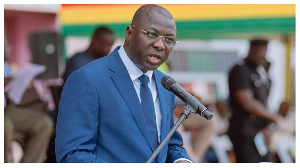Ghana will require between $9.3billiin and $15billion over the next ten years to successfully implement its reference programme for climate action, the Minister of Finance, Dr. Mohammed Amin Adam, has said.
To this end, he noted, it had become more than imperative for a centralised point within the Ministry of Finance to coordinate and co-lead in the activities that would help raise the necessary finances, and implement activities of the climate action plan to be established.
“The fact is that all available scientific predictions assure us that changing and extreme climate is almost guaranteed. Already, we are seeing the impact on lives and the economy. This impact requires us, as the Ministry of Finance, to reimagine our ‘business as usual model’ and prepare to respond to the financing challenges associated with the changing climate,” he emphasised.
Furthermore, Dr Adam indicated this when he formally launched the Climate Financing Division of the Ministry of Finance in Accra on Friday.
The new had been set up to effectively coordinate and co-lead in the Ministry’s mobilisation of the necessary resources for the implementation of the climate action plan.
It would also work to elevate all climate finance initiatives to enable the country to attract international funding, partner with domestic and external private sector investors as well as implement projects that promote green growth.
Dr Adam also noted the Division would serve as the central pillar around which the country builds and implement its climate financing strategies.
“In fact, this Division would allow us to attract the necessary expertise, provide strategic leadership, and ensure greater focus and visibility for climate finance within the Ministry and across the government,” he stressed.
He said climate resilience was not just an environmental goal but also fundamental to the country’s sustainable development and long-term economic prosperity.
Moreover, the Minister mentioned that by leveraging innovative financing tools, we can an ecosystem conducive to climate action, driving financial resources toward climate-resilient growth could be built.
He therefore called on all stakeholders—public and private sectors, international partners, and civil society to join the Ministry on the exciting new journey, adding that, “Together, we can ensure that Ghana emerges as a leader in climate financing and a champion of a sustainable future for all.”
The Chief Director of the Ministry of Finance, Eva Esselba Mends, on her partsaid the Ministry as an institution have had a history of dynamism and constant evolution.
She stated that perception of the drastic changes in development finance in the early 2000s resulted in institutional reforms that re-positioned the Ministry to better deliver our mandate.
This, she said, was demonstrated by consolidation of the International Economic Relations Division (IERD) with the External Resource Mobilisation – Bilateral and Multilateral Divisions into the current External Resource Mobilisation and Economic Relations Division (ERMERD).
In addition, she noted that the restructuring of Policy Analysis Division (PAD) into the current Economic Strategy and Research Division (ESRD) to respond to the developments in the real sector, including the oil, gas and petroleum industry, and ensure transparency in revenue reporting amply demonstrated how dynamic the ministry was.
Ms Mends indicated that the creation of the Climate Financing Division was a step informed by the significant changes that were evidently around, stressing that, “This Division will not only be a symbol of our commitment to building a climate-resilient economy but also a practical instrument to drive positive change and facilitate Green Growth.”
Click to view details



Business News of Tuesday, 22 October 2024
Source: ghanaiantimes.com.gh

















